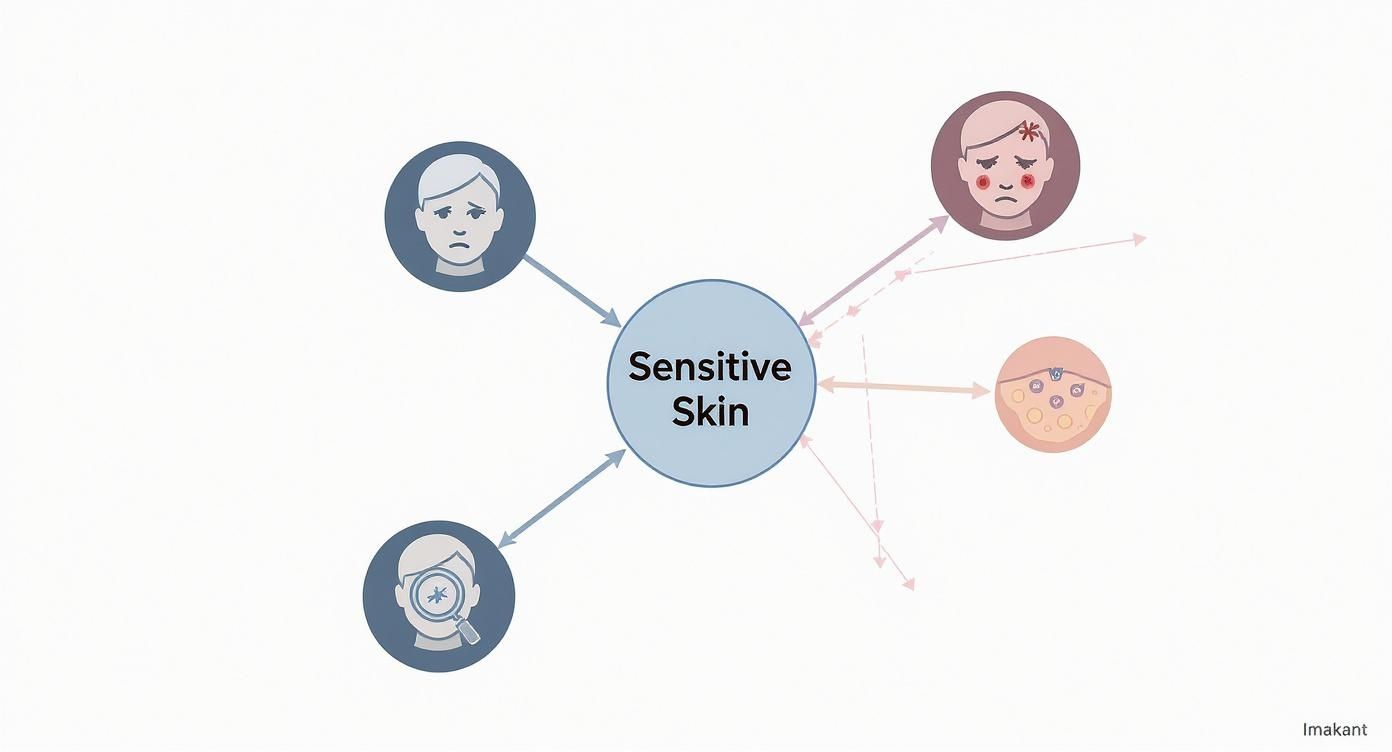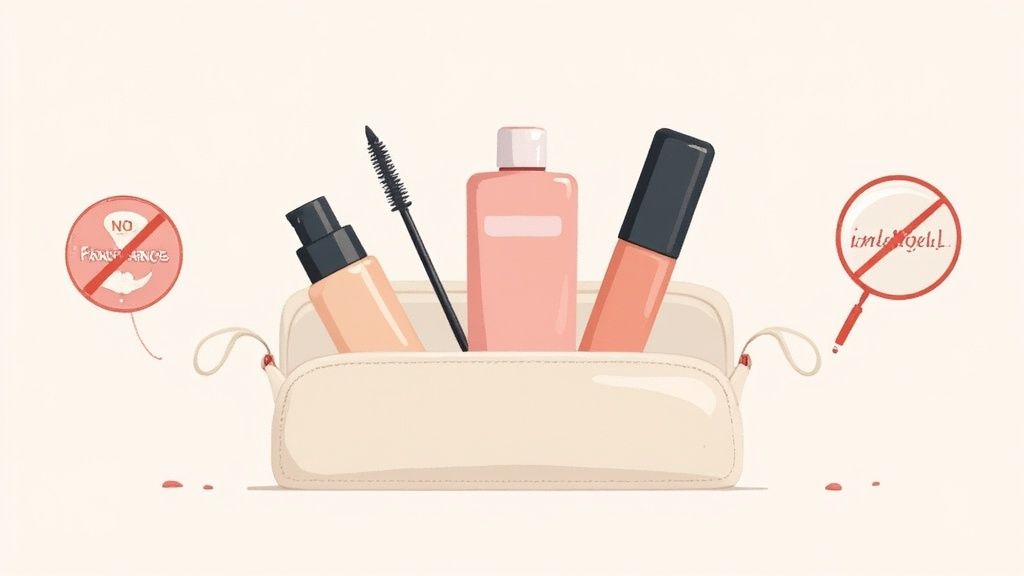Fragrance-free makeup is exactly what it sounds like: it’s formulated without any added scents. This makes it a non-negotiable for anyone with sensitive, reactive, or allergy-prone skin. It’s all about preventing irritation, redness, and flare-ups by cutting out one of the most common cosmetic triggers. The focus is on your skin's health first, so you can get that flawless look without any compromises.
Why Your Sensitive Skin Deserves Fragrance Free Makeup
If you have sensitive skin, rosacea, or eczema, trying to find new cosmetics can feel like walking through a minefield. Seriously. One wrong move—one irritating ingredient—and your skin is left red, itchy, and just plain uncomfortable. More often than not, fragrance is the culprit behind these reactions, acting like an unwelcome guest on your delicate skin.
Think of added fragrance in your makeup like static on a radio signal. Your skin is just trying to find its natural balance, but the constant interference from unnecessary chemicals disrupts that harmony. The result? Irritation and breakouts. This is why choosing fragrance-free makeup isn't just a trend; it's a must for keeping your skin barrier happy and healthy.
The Shift Toward Ingredient Transparency
Let's be real: consumers are getting smarter and are (rightfully) demanding to know what’s in their products. This growing awareness is shaking up the beauty industry, pushing companies to create cleaner, safer formulas.
The demand for gentler products is impossible to ignore. Sales of paraben-free (and often fragrance-free) beauty items are growing 80% faster than the rest of the cosmetics market. This is a huge signal that people are prioritizing products they see as healthier.
This movement is about more than just dodging irritation. It’s about feeling empowered to understand exactly what you’re putting on your skin every day.
When you opt for fragrance-free products, you're taking a real, proactive step toward a simpler, more effective beauty routine. And if you really want to support healthy skin, think about adding other clean products like chemical-free face moisturizers to your lineup. Making conscious choices like these sets the stage for a beautiful look that doesn’t sacrifice your skin’s long-term health.
Decoding Labels Between Fragrance Free and Unscented
Trying to figure out makeup labels can feel like solving a puzzle, especially when you see words like "fragrance free" and "unscented" thrown around. Brands often use them interchangeably, but for your skin, they mean two very different things. Knowing the difference is your first line of defense against irritation.
Simply put, fragrance free makeup is exactly what it sounds like: a product with zero added scents, synthetic or natural. The goal is to keep the formula as neutral as possible, which is a game-changer for sensitive skin. It’s about eliminating potential irritants from the get-go.
"Unscented," on the other hand, is a bit of a trickster. A product labeled "unscented" might not have a noticeable perfume, but it often contains masking chemicals. These are sneaky ingredients added to cover up the natural, sometimes funky, smell of the raw cosmetic ingredients. These masking agents can be just as irritating as any perfume.
The Problem with Masking Scents
Think of it this way: "fragrance free" is like a room with the windows thrown open, letting in nothing but fresh air. "Unscented" is like spraying air freshener to hide a weird smell. You're not actually getting rid of the source; you're just adding another layer of chemicals into the mix.
This is exactly why "unscented" can be such a misleading claim for anyone with reactive skin. Even if you can’t smell a perfume, your skin might still throw a fit over the masking chemicals. Research has shown that preteens' and adults' skin can be more permeable and is still developing, making it more vulnerable to the chemicals in synthetic fragrances and masking agents.
This infographic breaks down some of the common reactions sensitive skin can have when it comes into contact with irritating ingredients.

As you can see, layering on unnecessary chemicals can trigger anything from redness to breakouts. It’s why a truly fragrance-free formula is always the safest bet.
Comparing Common Label Claims
To help you shop with confidence, let's break down some of the most common claims you'll spot on makeup packaging. Understanding what these terms really mean empowers you to make smarter choices for your skin. For an even deeper dive, check out our guide to fragrance free beauty products.
Here’s a quick cheat sheet to help you cut through the marketing noise and understand what you’re really buying.
Fragrance Claims On Makeup Labels Explained
| Term | What It Means | Who It's Best For |
|---|---|---|
| Fragrance Free | No added fragrance or masking agents. Simple as that. | Anyone with sensitive skin, rosacea, eczema, or allergies. This is the gold standard for avoiding irritation. |
| Unscented | Could contain masking chemicals to hide ingredient odors. It's not necessarily free of fragrance chemicals. | People who just dislike smelly products but don't have major skin sensitivities. It's a riskier pick for reactive skin. |
| Hypoallergenic | Formulated to be less likely to cause an allergic reaction. But the term isn't regulated, so it’s a bit of a gamble. | Those with known allergies, but you absolutely should patch-test first. Don't take the label's word for it. |
| Dermatologist-Tested | A dermatologist has overseen testing on human skin. This doesn't guarantee it's free of irritants for your specific skin. | Shoppers looking for an extra stamp of approval, but it’s no substitute for reading the ingredient list yourself. |
The takeaway here is pretty clear: if your goal is to keep your skin happy and calm, always choose "fragrance free" over "unscented". At the end of the day, flipping that package over and reading the full ingredient list is the only way to be 100% sure what you're putting on your skin.
Here's why going fragrance-free with your makeup is a much bigger deal for your skin's health than you might think.
The Hidden Health Benefits of Going Fragrance Free
Switching to fragrance-free makeup isn't just about avoiding a little redness here and there. Think of it as a long-term wellness strategy for your skin, kind of like how eating well supports your whole body. When you cut out unnecessary irritants, you're giving your skin the breathing room it needs to really thrive.
Imagine your skin’s moisture barrier is like a well-built brick wall. The skin cells are the bricks, and natural fats called lipids are the mortar holding everything together. Fragrance molecules, especially synthetic ones, can act like tiny wrecking balls, chipping away at that mortar and creating micro-cracks in your skin's defenses. This damage lets moisture escape and leaves you wide open to environmental stress.
When you choose fragrance-free makeup, you stop this daily attack. Your skin can finally switch from constant "damage control mode" to doing what it’s meant to do: repair, regenerate, and protect. Over time, this leads to a stronger, happier, more resilient complexion.
Reducing Chronic Inflammation
One of the biggest wins is cutting down on low-level chronic inflammation. Even if you don't have a full-blown allergic reaction, synthetic scents can keep your skin in a quiet, constant state of stress. This simmering irritation can actually speed up aging and make things like rosacea and acne worse.
When your skin isn't busy fighting off invisible irritants, it can finally function at its best. That means better hydration, a more even skin tone, and an overall calmer look and feel. You're basically creating a peaceful environment for your skin cells to do their job.
And it seems like everyone is catching on. The global clean beauty market, which is packed with fragrance-free options, was valued at a huge $8.25 billion in 2023. It’s expected to shoot up to $21.29 billion by 2030. That kind of growth shows a massive shift in what we all want: safer products that are honest about what's inside.
Enhancing Your Skincare Routine
Here's something people often miss: going fragrance-free can make your other products work way better. When your skin barrier is weakened by fragrance, it can’t properly absorb all the good stuff from your expensive serums and moisturizers.
By ditching the irritants, you're clearing the way for powerhouse ingredients like hyaluronic acid, vitamin C, and peptides to get in there and do their thing without any interference. Your skin becomes way more receptive to nourishment, so you actually get the benefits you're paying for.
Ultimately, it’s a simple choice that supports your overall well-being. For anyone with sensitive skin, avoiding fragrance is a powerful act of self-care, much like practicing other natural stress reduction techniques. It's an easy way to be kind to your skin, helping to prevent new sensitivities and keeping your complexion calm, healthy, and glowing for the long haul.
Finding High-Performance Fragrance-Free Makeup

Okay, so we're all on the same page: fragrance-free makeup is a must for keeping skin happy and calm. Now for the really fun part—building your perfect, irritation-free makeup kit.
It’s actually easier than ever to find amazing products that perform beautifully without causing a reaction. It just takes a little know-how and a willingness to become a label detective.
The first step is looking past the "fragrance-free" claim on the front of the bottle and scanning the full ingredient list for sneaky, hidden scents. Even things that sound natural and lovely can be major irritants for sensitive complexions.
How to Spot Hidden Fragrances
Marketers are smart. They know we're getting wary of the word "fragrance," so some brands will use individual scent components that fly under the radar. Your mission, should you choose to accept it, is to learn how to spot them.
Keep an eye out for these common culprits on an ingredient list:
- Essential Oils: Yes, they're natural, but oils like lavender, peppermint, and citrus can be incredibly reactive for some skin types.
- Linalool: A naturally occurring compound found in tons of flowers and spice plants that gives them their scent.
- Geraniol: Another super common scent chemical, this one comes from plants like geraniums and roses.
- Limonene: You know that citrusy smell? This is the chemical responsible, found in the peels of citrus fruits.
- Cinnamal: This is the compound that gives cinnamon its signature warm, spicy scent.
The whole point is to eliminate potential triggers. Just because an ingredient is plant-derived doesn't mean it won't cause a reaction if your skin is sensitive. True fragrance-free makeup will be completely free of all these components. For anyone with highly reactive skin, it's also a great idea to explore products specifically designed as hypoallergenic makeup for sensitive skin.
Where to Shop for Trusted Products
The good news? Finding quality fragrance-free makeup isn't the niche scavenger hunt it used to be. Many mainstream stores now have entire sections dedicated to clean and sensitive-skin-friendly beauty.
- Drugstores: Big chains like CVS and Walgreens often have "clean beauty" aisles now. Check out brands known for their gentle formulas, like Tower 28, Clinique, and Almay.
- Beauty Retailers: Places like Sephora and Ulta make it easy. You can filter your online searches for "fragrance-free," and their staff are usually great at pointing you toward brands that focus on ingredient safety.
- Direct from Brands: This is my personal favorite. Independent, eco-conscious brands like us at Axiology sell directly online. It's often the best way to find truly innovative, clean, and gentle formulas that you might not see in big box stores.
Look for Certifications and Seals
Want a quick shortcut to finding products you can trust? Look for third-party certification seals on the packaging. Think of them as a stamp of approval, confirming a product has already been vetted for sensitive skin.
One of the most reliable seals out there is the National Eczema Association Seal of Acceptance. Any product with this seal has been seriously evaluated to make sure it's free of ingredients known to irritate eczema or other sensitive skin conditions. It's a huge green flag that you can trust what's inside.
Application Tips for a Flawless, Gentle Finish
Finding the perfect fragrance-free makeup is a huge win for sensitive skin, but it turns out how you put it on matters just as much. Even the best, cleanest formula can still stir up irritation if you’re too rough with your application. A gentle touch is your best friend for keeping skin calm, clear, and happy all day.
The whole process really starts before you even think about picking up your foundation. I like to think of my skin as a canvas—you wouldn’t start painting on a surface that’s dusty or uneven, right? Your skincare prep creates that smooth, hydrated base that helps makeup glide on beautifully without having to be scrubbed in.
That means starting with a gentle cleanser followed by a soothing, fragrance-free moisturizer. A calm, well-prepped base is way less likely to react and helps your makeup not only look better, but last longer, too.
The Tools and Techniques That Matter
For those of us with sensitive skin, the tools you use are your first line of defense against irritation. It's easy to forget, but dirty brushes and sponges are basically a party for bacteria, which can easily trigger breakouts and redness.
Always start with clean hands and tools. Seriously, this little step is non-negotiable.
Here are a few gentle application methods to get on board with:
- Patch Test First: Before you go all-in with a new product, test a tiny bit on your jawline or behind your ear. Give it 24 hours to make sure your skin is cool with it.
- Press, Don't Rub: This is a game-changer. Instead of dragging or rubbing foundation across your skin, use a damp beauty sponge or a soft brush to gently stipple or press the product in. This technique gives you gorgeous, even coverage without causing friction or making you red.
- Build in Light Layers: The ‘less is more’ approach is everything. Apply your fragrance free makeup in super thin, sheer layers, building up coverage only where you feel you need it. This helps you avoid that heavy, cakey look and minimizes the amount of product just sitting on your skin.
A gentle routine doesn't mean you have to sacrifice performance. By focusing on smart application and proper prep, you can achieve a flawless, professional finish that respects your skin's delicate balance and keeps it looking radiant.
Ultimately, mastering these simple techniques can make all the difference for reactive skin. For more tips on making your gentle look last, check out our guide on how to make makeup last all day. It just goes to show that a mindful application can deliver both comfort and serious staying power.
Common Questions About Fragrance Free Makeup

Dipping your toes into the world of fragrance-free makeup can bring up a few questions. I get it. So, let’s clear the air on some of the most common ones so you can feel confident and keep your sensitive skin happy.
One of the biggest mix-ups is around “natural” scents. People often ask if essential oils are a safe alternative to synthetic fragrances. For most of us with reactive skin, the answer is a hard no.
Even though they come from plants, essential oils are incredibly concentrated and can be major irritants. They often cause the same redness and allergic reactions as their artificial counterparts. That's why a truly fragrance free makeup product skips both. The whole point is to remove all potential triggers, whether they're made in a lab or come from a flower.
Is My Makeup Causing a Reaction?
So, how do you know if your makeup is the bad guy? It’s not always a five-alarm fire kind of rash. Sometimes, the signs are sneakier and build up over time.
Be on the lookout for clues like these:
- Persistent Redness: Is your skin looking a little flushed or blotchy after you put on your makeup?
- Small Bumps: Seeing tiny, rash-like bumps that aren't quite pimples?
- Itching or Tightness: That uncomfortable, dry feeling that shows up out of nowhere.
If you think a product might be the problem, the best thing to do is stop using it right away. Try an elimination diet for your face: remove one product from your routine for a week at a time. This is a great way to pinpoint exactly what your skin can’t stand.
And please, remember that a patch test is your best friend when trying anything new. It’s a super simple step that can save you from a whole lot of irritation. It’s the key to making sure your journey with fragrance-free makeup is a smooth one.
Ready to discover high-performance makeup that loves your skin back? Explore the clean, gentle, and vibrant world of Axiology. Our products are always 100% vegan, cruelty-free, and formulated without fragrance for a beautiful finish you can feel good about. Shop our collection today.





